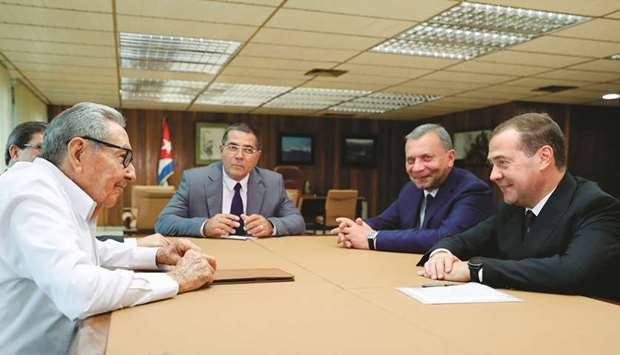Russian Prime Minister Dmitry Medvedev lambasted the Trump administration for trying to create a “toxic atmosphere” around Cuba, during a two-day trip to the island demonstrating Russia’s support for its Communist government.
The former Soviet Union was Cuba’s main backer for decades and Moscow has sought to renew its commercial, military and political ties with the island in recent years.
The effort is part of Russia’s broader strategy to expand its presence in Latin America as a counterweight to China and the US.
Medvedev’s visit — the highest profile Russian tour since that of President Vladimir Putin in 2014 — is symbolically important, showing Cuba still has powerful allies that will help it resist US pressure.
“(The US) desire to create a toxic atmosphere around co-operation with the island, to scare off investors and create an energetic blockade is obvious,” Medvedev told reporters after holding official talks with
Cuban President Miguel Diaz-Canel and agreeing to strengthen strategic co-operation. “But Cuba’s experience resisting the blockade for nearly 60 years shows that this policy will fail,” Medvedev stressed.
Medvedev said Cuba could always rely on Moscow’s support. “In Russia, Cuba has partners and dependable friends,” Medvedev said.
For Russia, the visit could also be important to shore up Cuban support for their mutual ally, Venezuelan President Nicolas Maduro, some analysts said.
Venezuela has become one of Russia’s top proxy battles with the Trump administration, they said. Moscow also has commercial interests there.
Russia has the potential to help Cuba out of its current fuel crisis, which Havana blames on US sanctions on energy shipments to the island.
Medvedev and Diaz-Canel signed a series of commercial deals in the infrastructure, medical and industrial sectors, while the latter confirmed he would travel to meet with Putin at the end of October in Moscow, a month after Maduro.
Russian exports to Cuba more than doubled in 2017 to $414mn and rose to $440mn last year, according to official Cuban data.
While that remains less than a third of Spanish, Chinese or Venezuelan exports to Cuba, it looks set to continue rising.
Russian exports include hundreds of cars and minibuses as well as dozens of locomotives.
“For Cuba, the symbolism is that the US strategy of economic strangulation will fail because Cuba can turn elsewhere for support — just as it did during the Cold War,” said William LeoGrande, a professor of government at American University.
US sanctions are therefore achieving the opposite of Washington’s foreign policy goals, pushing Cuba into the arms of its old allies, said US politicians who support engagement.
“I wish we were signing agreements with the Cubans and not the Russian,” Massachusetts Congressman James McGovern told reporters on Thursday during a visit to Cuba as the head of a delegation of business people. “The US needs to be engaged in the world. Where and when we are not engaged, China and Russia will be.”
Later Medvedev visited Havana’s Capitol building, the golden dome of which has been restored with Russian financing. On Tuesday, China’s ambassador to Cuba, Chen Xi, said “China is supporting and will always support...the Cuban people in their socialist efforts.”

Cuba’s first secretary of the Communist Party and former president Raul Castro speaks with Russian Prime Minister Dmitry Medvedev during their meeting in Havana.
